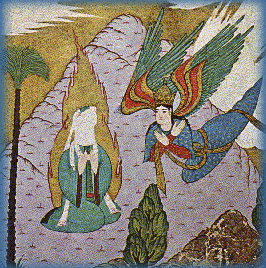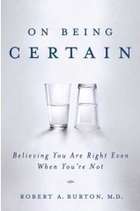Religion is often juxtaposed against conscience. There is a good reason for this: religion is truth that descends upon man, whereas conscience is truth that emerges from within man.
That said, it should not be maintained that moral intuition is intrinsically antagonistic to faith. The Zoroastrian religion uses conscience synonymously with religion—and quite literally: the Avestan word for religion, “Daena” (akin to the Persian-Arabic “Din”), is also the Avestan word for conscience.
“Conscience” has two related meanings. First, it is a moral intuition (literally, a “knowing”). Secondly, it is a sense of shame. In religious circles, the latter usage is often employed, inasmuch as moral intuition is often rejected. Zoroastrianism appears to use the concept in both senses.
In Christianity, there is of course plenty of shame, but though men are seen as flawed, conscience is treated more as a moral intuition than a capacity for shame:
When the Gentiles, which have not the law, do by nature the things contained in the law, these, having not the law, are a law unto themselves: Which shew the work of the law written in their hearts, their conscience also bearing witness, and their thoughts the mean while accusing or else excusing one another … —Epistle of Paul to the Romans
And again:
Love worketh no ill to his neighbor: love therefore is the fulfilment of the law. —Epistle of Paul to the Romans
From such sayings of Paul, “examination of conscience” has become orthodox Catholic practice. It does not presume a state of guilt, but rather presumes a capacity to distinguish right from wrong:
Directly, this examination is concerned only with the will, that is, with the good or bad intention that inspires one’s thoughts, words, and actions. — Catholic Encyclopedia: Examination of Conscience
Again, some other scriptures focus more on incapacity and shame. This appears to be the case with Baha’u’llah, who emphasized the Judeo-Islamic notion of religion as revelation of and adherence to divine law.
Regarding the incapacity of man, Baha’u’llah said:
Man is unable to comprehend that which hath streamed forth from the Pen of Glory and is recorded in His heavenly Books. Men at all times and under all conditions stand in need of one to exhort them, guide them and to instruct and teach them. —Lawh-i-Maqsud
Regarding fear and shame:
The fear of God hath ever been a sure defence and a safe stronghold for all the peoples of the world. It is the chief cause of the protection of mankind, and the supreme instrument for its preservation. Indeed, there existeth in man a faculty which deterreth him from, and guardeth him against, whatever is unworthy and unseemly, and which is known as his sense of shame. This, however, is confined to but a few; all have not possessed and do not possess it. —Words of Paradise


